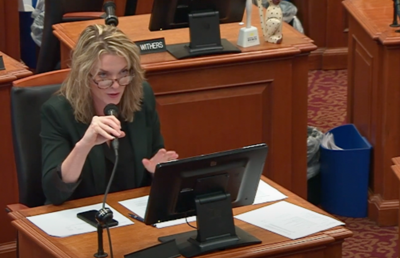Metro Council District 26 might be the quintessential cross-section of Davidson County. It boasts a city destination in the Nashville Zoo, renters and homeowners share neighborhoods like Crieve Hall and Paragon Mills, and clear commercial districts cater to ethnically and economically diverse residents.
During the last election cycle, Courtney Johnston won the district over Jeremy Elrod with 1,400 votes and about $10,000. Four years later, she has $50,000 in the bank, an eye-popping number more typical for countywide races and downtown districts ripe for development. She’s raised even more since filing her year-end disclosure on Jan. 31, a substantial cushion for reelection that could fuel a future run for higher office.
Johnston has won favor among right-leaning business interests, and with the exit of Councilmember At-Large Steve Glover a year ago, she looks to be the chosen Metro Council conservative in this election cycle. In her first term, Johnston established herself as a firm ally of law enforcement, leading the body’s push for automated license plate readers, controversial surveillance technology that was criticized by her colleagues as overly invasive and too broad in its data collection. She was tapped as vice chair of the Public Safety Committee and became a fiscal watchdog on the ad hoc Financial Oversight Committee, set up to distribute federal funds related to COVID relief.
“A lot of my colleagues are further left-leaning, but we agree more often than not because good policy is good policy,” says Johnston, who declines to identify with a party label. “I’m not out here fighting abortion or LGBT anything, like some conservative-leaning groups want me to and have pressured me to do. That’s not what I’m here to do. But we can all agree on fiscal responsibility.”
Lately, Johnston has been preparing for state legislation that would reduce the size of Metro, telling the Scene that she supports measures to add staff, increase pay and professionalize councilmembers’ role as legislators, which would also check the power of the mayor’s office.
“The legislation is basically a done deal," Johnston says. "My position on it is to react in a way that limits collateral damage. I certainly had my questions about how to effectuate it, and I think that’s the challenge. When I understood it was going to happen, I didn’t ask, ‘What can I do to stop this?’ My mind went to, ‘If we do this right, it can be a massive shift in a positive way for local government and Davidson County.’”
She did not answer the Scene’s questions about whether she had met with state lawmakers on the topic, a rumor being circulated among her council colleagues. Bill Hostettler and Bobby Joslin, part of a local business contingent pushing for council reduction, both wrote Johnston checks in December.
District 26 waits in purgatory while state lawmakers determine how and when they will slash Nashville’s Metro Council. Johnston plans to be on the council regardless. Uncertainty motivated her fundraising push in November, December and January, an additional reason to build a cushion while she waits to chart a path to reelection.
“I don’t know how big of a campaign I’m going to need to run in order to be reelected to my district seat,” Johnston tells the Scene. “I want to raise as much money as I can to be prepared for whatever I need to be prepared for. Whatever’s left, I can use that for whatever race I may enter in the future.”
Johnston's total puts her in a good position to be a fixture in Nashville politics for another four years. Contributions from PACs backed by the Titans, Waller and the Nashville Convention & Visitors Corp show consolidated downtown support.
Across the river, newcomer Clay Capp brought in $46,000 for a bid to represent East Nashville’s District 6 — he and Johnston offer a first glimpse at 2023 council elections that could bring bigger money and bigger campaigns to district races.





